André Cluytens(26th Mar. 1905 ~ 3rd Jun. 1967)
[ The underrated maestro ]
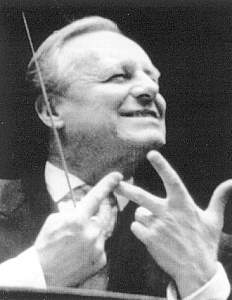 3André Cluytens [ from the 20th
century conducts release, by IMG Artists ]
3André Cluytens [ from the 20th
century conducts release, by IMG Artists ]
French artists tend to be not regarded(in Korea). Surely Pierre Monteux and Charles Munch were maestros, but their records are not very popular now. Such was French pianists, who are rarely commented by critics except Alfred Cortot and Samson François. Unfortunately, André Cluytens1) is in the same cases. Recent release by IMG management '20th century conductor series' was titled as 'The underrated maestro' - I guess it is international, not only in Korea.
André Cluytens was born not in France but in
Antwerp, Belgium. His grandfa was also conductor. Father
was conductor of Royal Opera of Antwerp, mother opera
singer. It was natural that he should be taught to be a
musician thoroughly. He entered Royal Flemish
conservatory on 1914, graduating as Summa Cum Laude
on 1922. His first chair was korrepetiteur of Royal opera
to 1927, débuting by Pearl Fisher(Bizet)
there. He soon succeeded father, and was invited by
Toulouse Capitol Opera, which was the first career in
France. Lyon Opera(1935), Bordeaux Opera(1938), Paris
Opera(1942), Opera Comique(1947~53), Paris
conservatory(1949~67), France National Radio(ORTF)(1950~
). Fianlly he naturalized to France, but accepted musical
director of Belgium National Orchestra. France gave him Région d'honeur.
His peak time started on 1949, when he
succeeded Munch at Paris Conservatory Orchestra.
Different from Monteux and Munch, he never held position
in America and not frequently appeared at England.
However, he conducted almost all the famous orchestras in
Europe, including Philharmonia, Vienna & Berlin
Philharmonic, even Bayreuth and La Scala. He escorted
Vienna Philharmonic as a guest conductor in American
tour, touring Japan and Russia with Paris Conservatory
Orchestra and ORTF. However, in 1967 he died from stomach
cancer, when he was mature as an artist. I think his last
recording is Berlioz 'L'enfance du Christ'(1966, EMI). A
historical fact added, Paris Conservatory Orchestra
finished its long history(140 years) shortly after his
death.2)
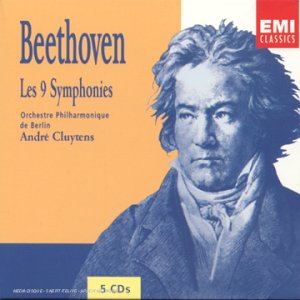 His style can be abbreviated as clarity,
soft touch of carpet, and moderate colorfulness. In
Beethoven his clarity is impressive, not ambiguous. His
rounded expression was crystallized at Pastorale,
very pure and clean performance.
His style can be abbreviated as clarity,
soft touch of carpet, and moderate colorfulness. In
Beethoven his clarity is impressive, not ambiguous. His
rounded expression was crystallized at Pastorale,
very pure and clean performance.
In general, German artists do not like
French works but French artists plays German works much
relatively, which proves that it is difficult to be
maestro by only French repertoires, so do Russians.
Monteux often played Viennese classics, and Munch's
interpretation of Beethoven and Brahms was famous3). Cluytens's favorite were Beethoven and
Wagner. He recorded Beethoven's complete symphonies with
Berlin Philharmonic in 1958~60(stereo), which is on
catalogue from now on. This set is memorable by two
records - the Philharmonic's first complete
Beethoven set at studio, and the only one by guest
conductor4). Wieland Wagner invited him to Bayreuth
from 1955 to 1958, highly evaluating his interpretation.
His Wagner experience was already 1940s at Paris Opera,
by 'Flying Dutchman', etc.
Contrarily,
his French musics are deserved to be called the
French style. In special, 'L'Arlésienne' and 'Carmen suite' is not
too much colorful, but very fresh, elegant, and with
proper dignity. Bizet's symphony is monaural but somewhat
speedy and fresher than Martinon, and especially Ravel
complete set with OSCC is wonderful by its colorful tone
- I have illusion to see the Swissian watchmaker whenever
listening to this set. Moreover, OSCC, at the top, has
very good masterly technique of the wind sections that is
absolutely necessary for the French impressionists.
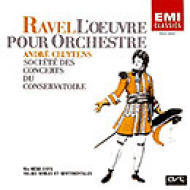 His recordings of
German repertoire are pretty much, but French works are
more familiar in general. Testament's recent issues
include his monaural recordings in 1950s6), which were very rare items like
Roussel's Symphonies(stereo) as CD outside Japan. In
these repertoires considerable sums are re-recorded by
stereo. I heard the former is more or less faster than
the latter, same to the conventional cases.
His recordings of
German repertoire are pretty much, but French works are
more familiar in general. Testament's recent issues
include his monaural recordings in 1950s6), which were very rare items like
Roussel's Symphonies(stereo) as CD outside Japan. In
these repertoires considerable sums are re-recorded by
stereo. I heard the former is more or less faster than
the latter, same to the conventional cases.
However, the most popular recording is
the stereo version of Fauré's Requiem, of which beautiful
interpretation is unanimously praised. EMI regraded this
from FULL to MED only recently by Great Recordings series
release. His Ravel is at the first level surely. Daphnis
et Chloe(complete, stereo) should be gotten by
Testament coupled with Franck's Psyché suite(monaural),
but the rests are available by EMI 'Noir et rouge' 2for1
series. Of course, the performances are too valueable for
this budget grade. (Japanese issues are 4 CDs by Med
grades including Daphnis!7)) The two concertos with Samson Francois are
famous also.
His Berlioz list has 3 different Symphonie
Fantastique, L'enfent du Christ, and La
Damnation de Faust(extracts). Symphonie
Fantastique, the stereo Philharmonia version is
fairly famous(as of 2004, deleted from catalog), but
Japan live 1964(released by Altus and EMI - 20th century
conductor series) burns everything overwhelmingly, which
alludes he was a conductor different at live.
Debussy recordings include 'Jeux',
Suite 'Printemps', and 'Dance sacre et
profane' with Annie Challan. Prélude a la midi
d'un faune is not recorded in studio, but a Moscow
live is available(Japanese release). Bizet is highly
recommended. Symphony No.1 with ORTF(monaural) is very
good, but not famous partly because of its bad
availablity. Especially, Suite Arlésienne and
Carmen must be one of the best recordings of his.
Franck's Symphonic poems are recorded with Belgium
National Orchestra, also notable(but EMI release was
deleted from international catalog).
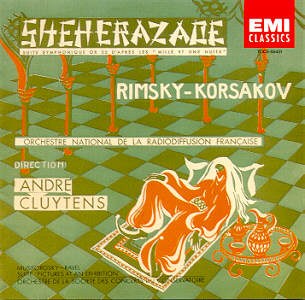 3 'Sheherazade'
and Pictures at an Exhibition ; Toshiba-EMI version
3 'Sheherazade'
and Pictures at an Exhibition ; Toshiba-EMI version
His
Russian repertoires are also good, next to French.
Shostakovich's Symphony No.11 and Piano concerto Nos.1
& 2(composer's solo) were recorded under presence of
Shostakovich himself. Mussorgsky's Pictures at an
Exhibition, Boris Godounov, Borodin, and
Rimsky-Korsakov's works are also included. Of course,
though harsh driving force of the traditional Russian
schools lacks in his performances, I guess his affinity
to these realm stems from Debussy and Ravel, who were
deeply influenced on by Russian composers. Most of these
recordings are available by EMI or Testament, and some by
Toshiba-EMI - Pictures at an Exhibition and
Sheherazade(monarual).
In his German works, Beethoven is
surely the first. I commented the symphonies, but perhaps
the most famous one is the violin concerto with David
Oistrakh produced by Walter Legge. He supported warm and
strong-outlined solo steadfast, and I like this
performance above all because the two player is far from
partial exaggeration or too much unnatural extravaganza.
Wagner's recordings are several Bayreuth lives(from
Melodram) and Preludes/Overtures with Paris National
Opera(now released by Testament). Orchestral excepts are
enough better than only named one, with sufficient power.
Liszt's Les Préludes and Schubert's Unfinished
Symphony were recorded with BPO. The latter is delicate
and beautiful(now available by Testament). Schumann
Symphonies are Nos.3, & 4, which are all monaural.
The former's orchestra is BPO(1957), and the other with
ORTF(1950). It's not easy to get, only available by
Toshiba-EMI. I luckily have it, of which performance have
no scruple, and with confidence.
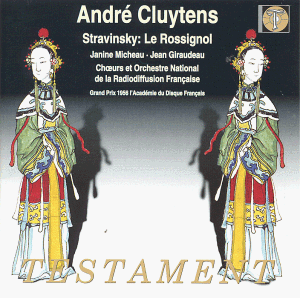 When young, he had long experience in opera
houses. Therefore, he made many complete opera recordings5). After he contracted Pathé-Marconi
in 1946, he proceeded recordings with the two orchestras
- ORTF and OSCC of which he directed. At the opera
repertoire, mainly with Paris National Opera and Opera
Comics in monaural era, and with OSCC and VPO in stereo
era.
When young, he had long experience in opera
houses. Therefore, he made many complete opera recordings5). After he contracted Pathé-Marconi
in 1946, he proceeded recordings with the two orchestras
- ORTF and OSCC of which he directed. At the opera
repertoire, mainly with Paris National Opera and Opera
Comics in monaural era, and with OSCC and VPO in stereo
era.
Almost
all of the opera recordings at studio are in French
repertoires. The series with Paris Opera Comic Orchestra
is interesting - Les pêcheurs de perles, Carmen,
Les Contes d'Hoffmann, Faust(Gounod), Les
mamelles de Tiresias, and L'heure Espagnole.
I guess Carmen is the first recording of the
premier version with dialogue. The works by Bizet and
Offenbach were casted as the regular members of the Opera
Comic, and the rests as famous singers active in France. Les
Contes d'Hoffmann and Faust were recorded
again by stereo, which are universally recommended
considering the sound quality. Faust has been
acclaimed by the powerful casts - Los Angeles, Gedda, and Christoph. The casts of Les
Contes d'Hoffmann is even better than Faust,
but score version is somewhat problematic by present
view. Pelléas et Mélisande released by
Testament is firmly classic. Lalo's Le roi d'Ys
is not released by CD outside Japan.
Russian operas are Boris Godounov(title
role is Boris Christoph, with OSCC), La Rossignol(with
ORTF) and Persephone(with OSCC) of
Stravinsky. German opera repertoire - Humperdink's Hänsel
and Gretel is studio recording and well-known, with
VPO, Irmgard Seefried and Anneliese Rothenberger
He was really a modest figure. I saw a film of 'Pictures at an exhibition' conducted by him(ORTF), in which he was very natural and not dictative to orchestra. It is said that the orchestra members, solists, and singers all liked him - it is not frequent case because the conductor has to control all of them8). I think it would be not too absurd that he was the man who was able to smile naturally like the photo at the top of this page, and who was praised by Gerard Souzay "hélas mort prématurément(sadly died so prematurely)" and that his good personality was well instilled into his recordings.
- I cannot know if the 's' of his family name has to be pronunciated.
- André Malraux, who was one of the best novelist of the 20th century and Cultural Minister of France, suggested Orchestre de Paris - after disbanding OSCC, of which the members was not restricted in the faculties of the Paris Conservatory. [ One example; concert master Luben Yordanoff was from Monte-Carlo Opera. ]
- Haydn's symphonies conducted by Monteux are on catalog now(Decca/VPO). Brahms's No.1 by Munch/Paris Orchestra(EMI) is famous.
- I know this set is the only recording of Beethoven's 9 symphonies by the French conductors who are as famous as he. Monteux recorded all the 9 symphonies but it is difficult to regard a complete set(Nos.1,3,6, and 8 with VPO/RCA, Nos.2,4,5, and 7 with LSO/RCA, but No.9 with LSO/Westminster). Munch, Plasson, Prêtre, Fremaux, and Lombard does not do it yet.
- Monteux was director of the Met, and recorded 'Manon(Massenet)' complete set - however, his longest seasons in orchestra pit was legendary Ballet Russe, not opera. Munch was totally for concert and a concert master of Gewandhaus under Furtwängler and Bruno Walter.
- Testament released many Klemperer and Furtwängler, but many French artists including Emile-Inghelbrecht and Cluytens. Cluytens's CD released by Testament are near 15 items.
- Japanese CD grades ; top(2,500~2,900 yen), med(1,600~2,000 yen), budget(900~1,200).
- It is natural that there are many dictators like Toscanini, Reiner, Szell, and Rodjinsky. Bruno Walter and Pablo Casals were 'exception in exception'.
- 20th century conductors by IMG artists(EMI release) ; EMI CZS 5 75106 2(2 set)
- EMI 'Artist profile' record ; EMI CMS 5 65318 2(2 set)
- Record images ; Amazon(French and US regional division), Japanese HMV.
- Thanks to Mr. Eduardo Cornesa, correction about a small error(birthday of Cluytens)
(c) 2002~ , Youngrok LEE ; Link free, but please get my approval before you reuse, copy, or quote this materials.
| Music Home | Photo Gallery | Discography | Jacket Images | Korean |
Created ; 10th Feb. 2004
(Korean text
created ; 28th Apr. 2002)
Last update ;
26th Sep. 2004